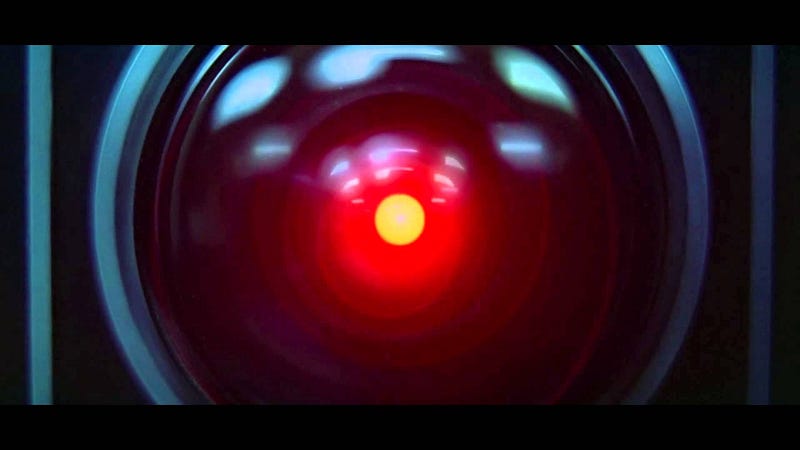Human vs. Machine Music Curation: Why We Need Anarchy In The A.I.
In a recent dig at Apple Music, Google's Eric Schmidt spoke out against human curated playlists, instead praising the idea of an artificially intelligent "tastemaker" service, designed to find the "next next big thing." But can A.I. truly hope to compete with the personalized touch of human curation?
______________________________________
Guest Post by Jim McDermott on Medium
In a recent BBC New Editorial about intelligent machines, Google Alphabet’s Eric Schmidt stooped to comment about digital music services, and in a perceived shot at Apple Music, said:
“In the next generation of software, machine learning won’t just be an add-on that improves performance a few percentage points; it will really replace traditional approaches. To give just one example: a decade ago, to launch a digital music service, you probably would have enlisted a handful of elite tastemakers to pick the hottest new music.
Today, you’re much better off building a smart system that can learn from the real world — what actual listeners are most likely to like next — and help you predict who and where the next Adele might be. As a bonus, it’s a much less elitist taste-making process — much more democratic — allowing everyone to discover the next big star through our own collective tastes and not through the individual preferences of a select few.”
I was a bit surprised to read him gobbing off about the future of online music services, seeing how Google’s own entry in the space, Google Play, is devoid of personality and not exactly setting the world on fire. And YouTube, a Google subsidiary, is rife with music illegally uploaded by users, while Google profits from ads served to the eyeballs viewing this infringing content. People in glass houses…..
Is there anything more elitist than saying humanity isn’t as good as an artificial construct? My dystopian nightmare is not one where androids dream of electric sheep, it’s one where people like Eric Schmidt create a machine to tell me what music I will listen to.

Schmidt’s comments are disturbing to me because streaming music is the present and future of music consumption. We’ve got 20 years of history with digital music behind us, and I’ve lost count of how many times I’ve heard some tech company CEO talk about how data systems were going to obsolesce human components in the music value chain. And usually the first people they suggest getting rid of is anyone who actually knows anything about music. “We’ve got a database that can do that!” they say. So no change here then.
Sure, there’s a place for recommendation engines and database driven playlists in music. Not everyone likes French Press, that’s why there’s drip coffee. I personally prefer a richer taste in my music, which is why I’ve never been satisfied by streaming music services. Until recently.
In contrast to Schmidt’s comments, I think Apple Music is delivering a better listening experience because they have focused on human curation. While the interface of Apple Music is ponderous and unwieldy, the human-curated playlists are clever and entertaining. The song selections are often obscure, clearly chosen for narrative flow, not by play count or ranking. I was told (by someone who’d know) that Apple spent a lot of time on their curated playlists, considering curation one of the keys to their success. They’ve had music “elitists” on staff since the beginning of the iTunes Music Store.
It takes a true fan of an artist or genre to “curate” well, to bring the listener on a voyage of discovery. Someone who truly lives the music can create a richer listening experience than a playlist created via data points. There is an emotional component in music and the arts in general that a database doesn’t get. Of course Schmidt’s point is that A.I. will eventually develop this emotional understanding, and data systems will save us from the scourge of elitists like John Peel or Alan Lomax.
How do these “elite tastemakers” Schmidt slights develop their emotional understanding, their connection to this music? Usually, via a lifetime of individual musical moments, imprinted directly on the soul. Afternoons spent lying on the carpet listening to haunted, crackling voices on a blues LP; or Saturday nights standing spot-faced in basement clubs watching dangerous punks play angry music to lost youths. Maybe it was after school, digging through indie record shop bins for rare dubplates, or DJing a 2am college radio show. They got close to the music, felt it, lived it. Very few of us do that and make a life of it. Fewer still are able to turn that experience into a commodity.

Beats 1's Zane Lowe, Julie Adenuga and Ebro Darden [photo: Apple/Instagram]
Curation is, in a sense, a form of teaching. In my musical life, I’ve met many special people who have a deep understanding of the music they love. Their empathy goes beyond the songs, into the history, the influences and connections between artists and genres, the visual components and the craft. They are musicians, artist managers, radio programmers, DJ’s, A&R people, record store employees, venue managers, writers, directors, instrument makers. I always come away from interactions with these people with hastily scrawled lists of records and books I need to buy, films I need to see. Even though I myself know much about music, they provide illumination and enrichment. They are all curators, and time spent with any of them makes it clear they cannot be replaced by any artificial construct.
Another important point is this: great music pushes and challenges the status quo. New genres often appear as a reaction to social conditions (think punk and rap) and often are initially disparaged by the mainstream. This music is born like a virus and spread by small groups of passionate people until it is popularized. Everything about these genres contradicts the concept of “what actual listeners are most likely to like next.” And this is true not just in music, but in many other forms of art (for example, the public’s initially hostile reactions to Impressionism, Cubism, Abstract Expressionism, etc). Mainstream society has shown throughout history that although they think they know what they’ll like, they really don’t. They need people at the bleeding edges of creativity to show the way. Would Schmidt’s democratic taste-making process have chosen to elevate the Sex Pistols? Not likely.
The most meaningful art has NEVER been created via a democratic process or a popularity contest. It is created via the obsessive creative vision of individuals who often are seeking to destroy the commonplace, the mainstream, the popular. In the music business you learn quickly that if you only give the people what they want when they want it, you will always be behind and eventually become extinct. The most successful people in the music industry don’t ask people what they want now, they give them what they’ll want next. A machine can’t stomp on concrete floors splashed with beer, sweat and blood to figure out what that’s next. A machine has no soul, and that is the essential ingredient of great art.
And you know, I doubt Eric Schmidt’s end game is simply using artificial intelligence to predict who the next Adele will be. I’ll bet he’s longing for an A.I. Adele — music created by the machine itself, using millions of data points and customized to be the exact version of Adele the machine thinks a listener wants. She’ll be synthesized on a data farm with a thousand solar powered servers with zero downtime — no more worries about Adele needing time off for voice polyps, or to have children, or for the dreaded writers block. She’ll always be on, continuously upgraded and producing for the investors, without a drop of soul to pollute her system. Her IPO will be huge.
Again, I’m no luddite, there is value in programming content based on trends in data. But it’s the height of elitism for a billionaire technologist to dismiss wholesale the value of curation by people who know something about music. Our obsession with disruptive technology and the individuals who become ultra-rich because of it isn’t going to end anytime soon. But I believe the pendulum will swing back towards more harmony between humanity and technology. Music isn’t going to get better by taking passion out of the equation.
One last thought for Mr. Schmidt: Before Google goes to work removing human curation from digital music services, perhaps you should instead use AI to remove infringing content from YouTube. If Google’s artificial intelligence can predict who the next Adele will be, it surely should be wise enough to remove illegal uploads of Adele’s music, instead of making copyright owners play an endless game of DMCA Whack-A-Mole.
Thank you!!! I’m no luddite either, I love tech, but it needs to know its place and how humans truly feel and work with its presence, and you got it spot on. Very inspiring. I laughed at the YouTube, DMCA whack a mole comment lol.
I think your last paragraph is extremely important. I run a small record label and we are constantly struggling with YouTube. People illegal upload our artists music everyday. Some of them get a lot of views (one of his tracks has over a million views). Our issue a lot of times is that these people monetize these videos. Without Content ID (which YouTube denied us for an unknown reason) our only option is to either make a copyright claim (thus removing the video and any chance of collecting future earnings) or do nothing. It’s a terrible position to be in. What makes it worse is there are impossible to get a hold of there. There are no numbers to call and the email system is horrendous.
Spot-on agree w/ the anti-AI sentiment, especially regarding predicting the future. Tech certainly has its place in adding convenience and possesses incredible ability to make estimates driven by data, but to assert that computers would altogether outdo humans in creative selection and taste is farfetched & insulting.
Speaking of ripping off art, I wonder if Banksy gets royalties for that skin on that apple computer at the top of the article, prob not lol. I agree true artists will never be replaced, though the masses generally don’t understand true art. It mostly takes other artists to recognize the value that art holds over time. Peoples ears are generally not developed enough to determine a great song or recording versus an average one. Most people are content with average well produced songs and this is what we are up against as artists. Only the upper echelon of true artistry will be irreplaceable (not Beyonce). Most music that is based on simple arrangement choices, language, and computer driven production will be easily replaced. The boom of easy to produce hit music in your bedroom will lose its value to AI and only the most exceptional artists will remain tangible (reminds me of the diva on 5th element, lol).
In short be exceptional artists,
http://www.facebook.com/rayspeakmoore
Hello Nick have you tried consulting an attorney to approach them on the matter, this was the only way I was able to get them to pay any attention to my requests. Sucks but I’m sure they are busy. They do need a better solution for this issue.